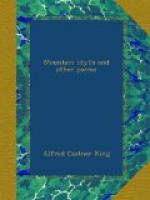The Miner.
Clink! Clink!
Clink!
The song of the hammer and drill!
At the sound of the whistle so shrill and clear,
He must leave the wife and the children dear,
In his cabin upon the hill.
Clink! Clink!
Clink!
But the arms that deliver the sturdy stroke,
Ere the shift is done, may be crushed or broke,
Or the life may succumb to the gas and smoke,
Which the underground caverns fill.
Clink! Clink!
Clink!
The song of the hammer and drill!
As he toils in the shaft, in the stope or raise,
’Mid dangers which lurk, but elude the gaze,
His nerves with no terrors thrill.
Clink! Clink!
Clink!
For the heart of the miner is strong and brave;
Though the rocks may fall, and the shaft may cave
And become his dungeon, if not his grave,
He braves every thought of ill.
Clink! Clink!
Clink!
The song of the hammer and drill!
But the heart which is beating in unison
With the steady stroke, e’er the shift is done,
May be cold and forever still.
Clink! Clink!
Clink!
He may reap the harvest of danger sowed,
The hole which he drills he may never load,
For the powder may e’en in his hand explode,
To mangle, if not to kill.
Clink! Clink!
Clink!
The song of the hammer and drill!
Facing dangers more grim than the cannon’s mouth;
Breathing poisons more foul than the swamps of the
south
In their tropical fens distill.
Clink! Clink!
Clink!
Thus the battle he fights for his daily bread;
Thus our gold and our silver, our iron and lead,
Cost us lives, as true as our blood is red,
And probably always will.
Life’s Undercurrent.
Within the precincts of a hospital,
I wandered in a sympathetic mood;
Where face to face with wormwood and with gall,
With wrecks of pain and stern vicissitude,
The eye unused to human misery
Might view life’s undercurrent vividly.
My gaze soon rested on the stricken form
Of one succumbing to the fever’s
drouth,
With throbbing brow intolerably warm,
With wasted lips and mute appealing mouth;
And when I watched that prostrate figure there
I thought that fate must be the worst to bear.
I next beheld a thin but patient face,
Aged by the constant twinge of hopeless
pain,
Wheeled in an easy chair from place to place,
A form which ne’er might stand erect
again;
I viewed that human shipwreck in his chair,
And thought a fate like that was worst to bear.
Within her room a beauteous maiden lay,
Moaning in agony no words express,
A cancer eating rapidly away
Her vital force,—so foul and
pitiless;
And when I saw that face, so young and fair,
I thought such anguish was the worst to bear.
[Illustration: “Have cut the deep gorge with its wonderful curves.”




